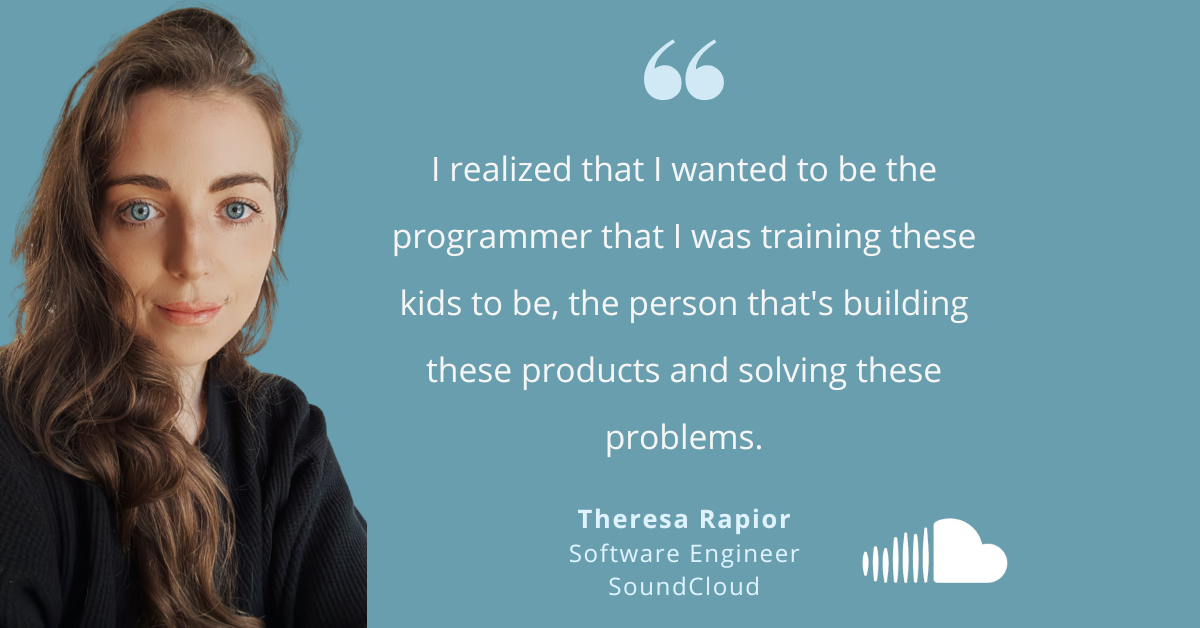Asking Theresa Rapior where she’s from is somewhat of a complicated question.
“I’m currently living in Los Angeles, but I was born in Germany,” she explains. “My dad's German, and my mom's American. I grew up mostly in Canada, then went to university in Scotland and studied in Cairo. And then, I lived in Korea for a couple of years before I moved to the States.”
Having lived in various corners of the world has not only given Theresa a unique perspective but has also helped her build valuable skills that she now uses as a Frontend Engineer at SoundCloud.
We sat down with Theresa to learn more about how she has connected archaeology and education to her transition into the computer science world. She also shared advice for those seeking to break into software engineering, but who lack the formal education.
Thinking Like Indiana Jones
As a teenager, Theresa had the unique opportunity to explore Egypt with her father and brother, an experience that would confirm her childhood dream to study archeology and Arabic.
“In November 2001, my dad took my brother and me to the north and south of Egypt. My dad had friends in the antiquities department so we got to go inside the Sphinx," she recounts. “I remember thinking: Wow, this is an adventure. Indiana Jones is the right path for me.”
Fast-forward to her early twenties and Theresa was back in the Egyptian capital pursuing archeological studies. However, when she realized that doing so as a lone foreign woman had its risky side, she decided to pivot to exploring Asia and teaching English in Korea.
Despite this shift, Theresa took away crucial lessons that would come in handy as a future software engineer.
“Archeology is very much like a crime scene investigation,” she explains. “You're trying to find evidence and explain something. Software engineering is a lot of problem-solving and asking the right questions.”
This way of thinking would stick with her throughout the rest of her career path.
Autodidact Mode: On
After two years of teaching English in Korea, Theresa decided to move to Los Angeles to be closer to her sister. Since teaching was the most recent addition to her resume, it made sense for it to be her start in a brand new city.
Although the transition from education to tech seems like it's going from one end of the spectrum to the other, it was Theresa's experience in education that helped shift her mindset to succeed in the tech world.
“This divide between whether you are smart or not smart is something that holds students back," she says. "I made this realization for myself and what I wanted to impart to the kids is that if anyone can do something, you can do it too.”
In 2013, Theresa put this lesson to practice when she decided to try to scale solutions related to education and working with kids.
“I started trying to learn Ruby, build websites, and work with WordPress to see if I could build and find product solutions that help solve problems,” she explains.
Over the course of three years, Theresa pivoted from teaching herself these skills in order to build platforms to creating lesson plans and teaching coding.
Teaching others to code not only helped her gain a better understanding of programming but also allowed her to challenge herself with more advanced projects. Eventually, she decided to change gears and focus on becoming a programmer.
“I realized that I still wanted to be the programmer that I was training these kids to be, the person that's building these products and solving these problems,” she recounts. “So I asked the one engineer who was working on the website in our office if I could join the web development team because I had all these product ideas. For example, we really needed a form for teachers to submit content—it was only email and it took days and days to do it. So, I designed and then helped build a platform.”
With this practical coding experience under her belt, Theresa was primed for software engineering opportunities to come her way.
Serendipity at SoundCloud
One of Theresa’s favorite anecdotes to share is that when she was in university around 2010, she recalls coming across SoundCloud and being obsessed with how it connected her to niche artists and genres. She even fantasized about working there.
“I remember thinking, ‘Wow, being an engineer at SoundCloud would be the coolest job, but that is not my trajectory.’ And the fact that it happened this way is extremely serendipitous. It’s a really special thing for me,” she shares.
When Theresa came to SoundCloud, she was the first woman in their Los Angeles office to join the engineering team and she was happy to find that her teammates were extremely helpful.
“I had learned a decent amount on my own, but the vast majority of what I know now, and the skills that I have is from my jobs. When I feel lost, I don't feel bad for asking a simple question.”
Theresa raves about the freedom and support she has received at SoundCloud to explore new things and engage in collaborative problem-solving.
“I was hired as a front-end engineer. But, I have some backend experience and my goal is to be a full stack engineer because I want to be able to work on the platform end-to-end,” she explains. “So my team has been giving me access to things and problem-solving with me when I ask or letting me explore. It's extremely supportive.”
In addition to this supportive company culture, Theresa also mentions that her coworkers’ sense of humor and their shared interest in music help level the playing field.
“It doesn't feel like there are any hierarchies,” she says. “There's no hierarchy of knowledge, you're always able to talk to whomever.”
The Lessons Along the Way
Through her diverse experiences and self-study, Theresa learned that the key to understanding complex or new topics, such as programming, was to understand the meaning behind what you are doing.
“Once you know the meaning of things, then you can form your connections," she explains. “It's about finding the connection between the new material and what you already know. Then you can find ways to apply new knowledge fast.”
She also points out the importance of creativity and how we can all access it.
“I used to think that if someone was creative, it meant they were supernaturally artistic, and that was something that I did not have. I was never creative, I didn't make art, and so I didn't have the capacity for creativity. And then I realized that when I was trying to come up with ideas for how to scale education and solutions, these ideas that I was having are creative.”
Theresa highlights that combining this creativity with problem-solving is crucial in software engineering.
“With software, you have to figure out what is the problem you're solving and break it down to find the most efficient solution, which can be creative and novel.”
4 Tips for Breaking into Tech
Theresa will be the first to admit that learning code on your own can be hard. She assures us that feeling frustrated and wanting to give up are valid feelings, but it’s just a matter of pushing through.
For those who have always wanted to pursue their dream career in software engineering, Theresa offers this advice:
- Gain experience. Theresa says that having a degree in computer science is valuable but not always necessary to get a job. “You just need to gain experience and be able to show proof,” she explains. “And showing proof can come from building a portfolio, even if no one looks at it. What is important is that, even without an academic background, it is key to know the core of a language and not just a framework built on top of it.”
- Be able to explain what you do. “You need to be able to explain how to build things. In coding interviews, they want you to talk out loud about what you're doing and why you're doing it,” she shares. “They want to know what it would be like if they assigned you a task and how you would do it.”
- Have the motivation to keep going. “If something's frustrating and it makes you cry or makes you want to quit, that’s okay. Maybe you can try again next week, find a different solution or drop the thing that made you upset,” she advises. "And then connect to something that’s a little more fun, just keep pushing; if anyone can do it, you can do it.”
- Resources, resources, resources. Theresa shares a helpful resource that shows the step-by-step process of how to become a developer. Studying this roadmap helped her secure her job at SoundCloud.




